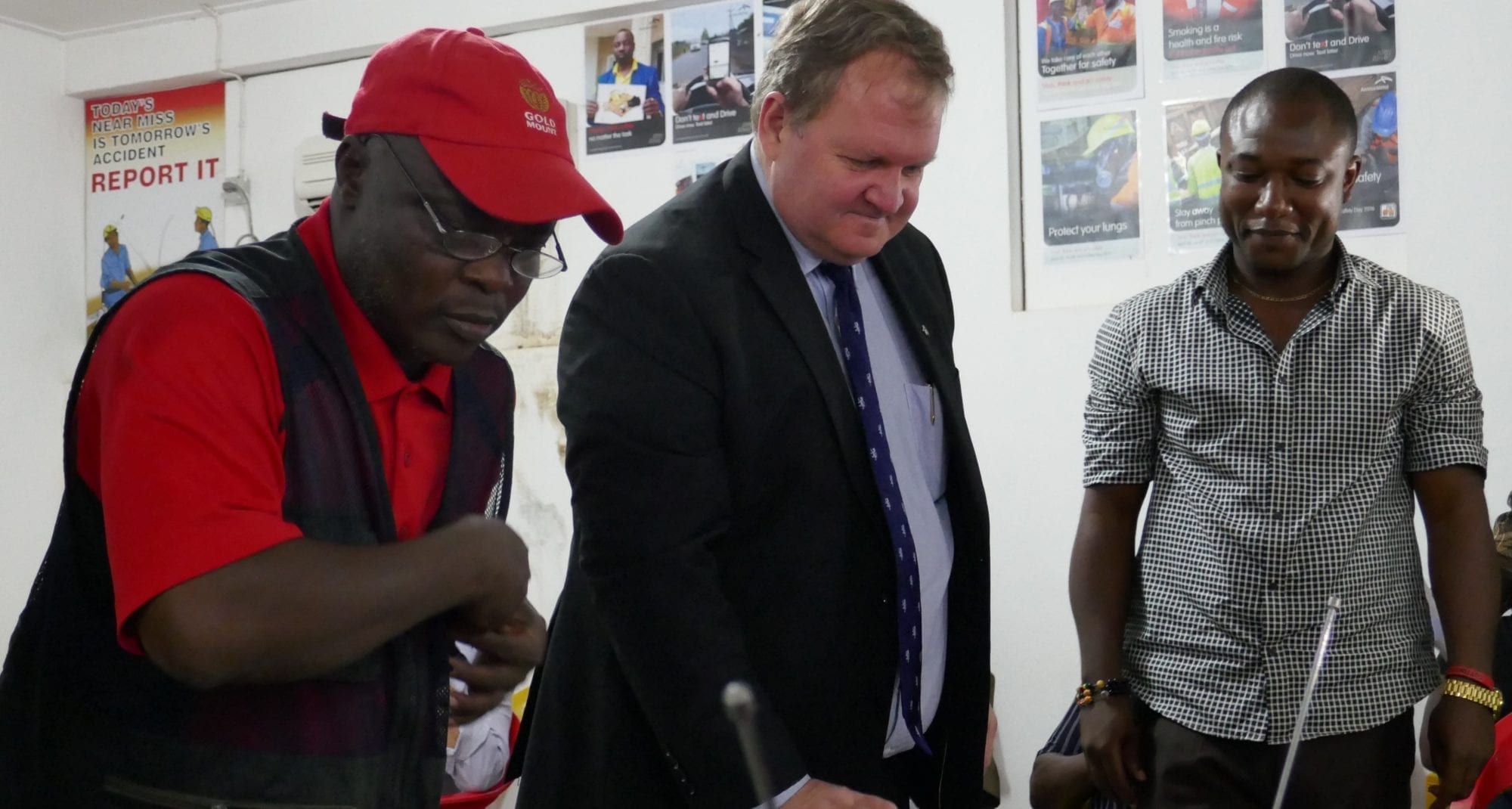
Mar 1, 2017
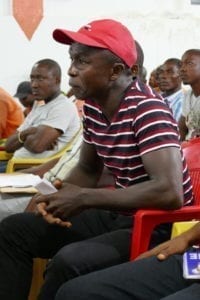
Member of ArcelorMittal Liberia Workers Union. Credit: Solidarity Center/Christopher Johnson
Hundreds of miners, forklift drivers and other workers at ArcelorMittal in Libera recently regained the jobs they lost following the 2014 Ebola epidemic and won back important benefits as part of a new collective bargaining agreement.
The ArcelorMittal Liberia Workers Union and the company late last month entered into the two-year agreement, which continues a joint health and safety committee and opened the door to higher wages through, “comprehensive job mapping to adjust salaries where they are inconsistent with the positions,” according to the union.
The United Workers Union of Liberia (UWUL) helped negotiate the agreement, and signed on behalf of the ArcelorMittal Liberia Workers Union. The workers’ chief negotiator and team members on this agreement had all participated in Solidarity Center training programs and consultations with Solidarity Center staff before negotiations began.
David Sakoh, UWUL secretary general, described the agreement as “an incredible achievement” given that it was completed during a “time of crisis,” which he said included the Ebola epidemic and falling commodities prices. ArcelorMittal last year reported a loss of nearly $8 billion due to falling steel prices and write-offs in its mining business.
The United Steelworkers (USW), Solidarity Center’s U.S. union partner in Liberia programs, thanked workers and management for their efforts to ensure through the new agreement that “the interests of workers will be represented and respected.”
The workers’ first agreement with ArcelorMittal Liberia was negotiated in 2012, making the company the second major investor in Liberia to sign a collective bargaining agreement (CBA). It came four years after a groundbreaking CBA between Firestone Natural Rubber Liberia and the Firestone Agricultural Workers.
Workers in Liberia have forged a decades-long partnership with the Solidarity Center and their counterparts in the United States, during which they received skills-development trainings to hone workers’ organizing and bargaining techniques, as well as support for their efforts to combat the Ebola epidemic, prevent child labor, improve Liberian labor law, address the growth of insecure informal economy jobs and seek gender equality within their unions.
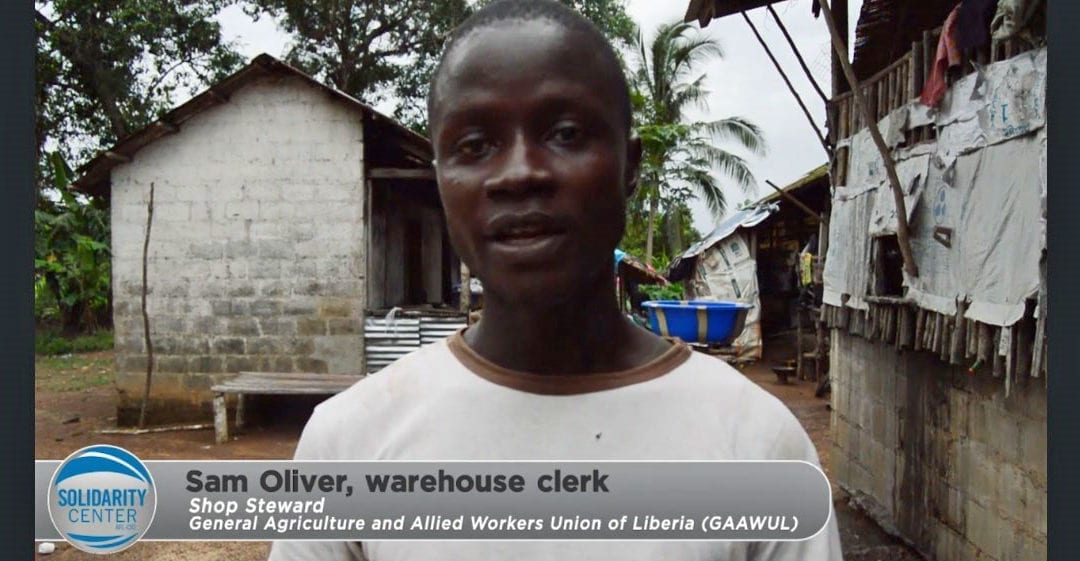
Nov 7, 2016
“When this union took over, people lived in deplorable housing. Through the intervention of this union, you can now see they are renovating some of these houses and negotiation is on the table so they can fast track the renovation.”
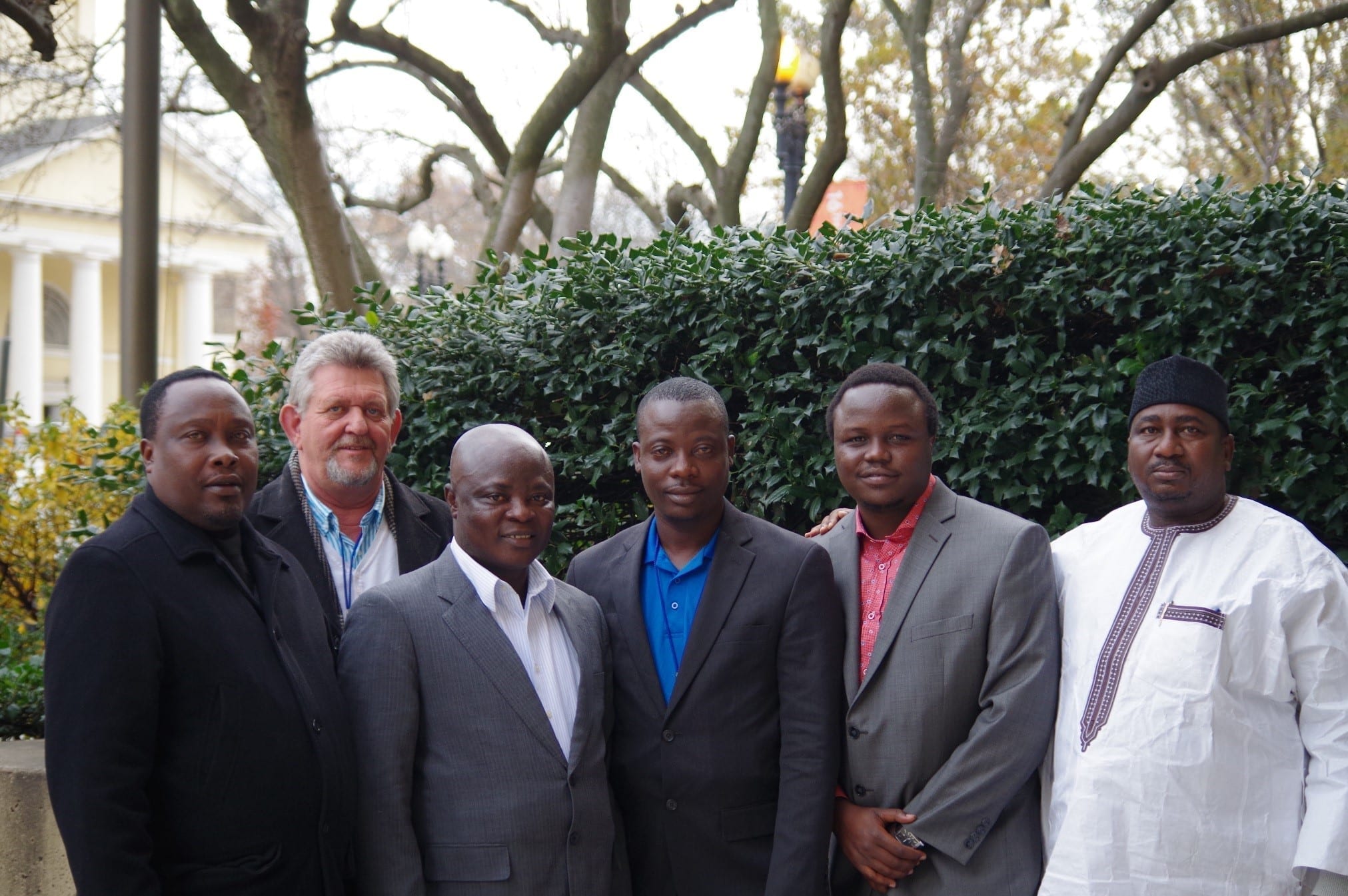
Dec 10, 2015
Addressing unemployment and underemployment, especially for young workers, is the most pressing issue for trade unions across Africa, according to participants in an African Labor Leaders Exchange Program sponsored by the Solidarity Center.
Speaking at a December 9 panel discussion at the AFL-CIO in Washington, D.C., six union leaders from Kenya, Liberia, Nigeria and South Africa discussed the challenges in securing economic prosperity for working people—and their strategies for empowering workers in the formal and informal economies.
“What faces us is high levels of unemployment, poverty,” said Edward de Klerk, deputy general secretary of South Africa’s United National Transport Union (UNTU).
“Unemployment is an African issue,” said Philip Kwoba, director of Youth Organizing with the Central Organization of Trade Unions (COTU) in Kenya. Unions in Kenya are reaching out to informal economy workers, which include many young workers, helping them form worker savings associations as a step toward unionization and gaining bargaining rights. “We are allocating resources to help,” said Kwoba.
Members of the panel, moderated by Solidarity Center Regional Program Director for Africa Imani Countess, said poverty also is fueled by low wages. “Wage inequality is this battle still we have got,” said de Klerk. In Nigeria, unions are tackling wage issues by addressing government policies that reduce the pay of public-employees, including teachers, said Muhammed Nasir Idris, National Treasurer Nigeria Union of Teachers (NUT).
Lack of employment opportunity and poverty in Liberia puts youth at risk of labor trafficking within the country’s borders, said Liberia Labor Congress (LLC) General Secretary David Sackoh.
Sackoh said labor recruiters take children from parents in their villages, promising the children will go to school in the city. Instead, the children are used in forced labor. “Even though our research shows (the children) want to return,” they are unable to do so for seven to 10 years,” he said.
Sackoh pointed to the Liberian trade union movement’s tremendous victory in eradicating child labor at the Firestone Natural Rubber Liberia plantation, and said the union movement now is working to address the issue at the seven other plantations across the country.
During questions with the audience, which included a packed crowd of union activists, policy experts and international experts, union leaders also discussed drawing more women into trade union leadership.
“Getting women elected to high offices is now on the union agenda,” said Boniface Kavuvi, general secretary of the Kenya Union of Commercial, Food and Allied Workers (KUCFAW). Kavuvi pointed to domestic workers in Kenya, represented by KUDHEIHA, as an example of dynamic organizing and strong leadership by women in Kenya. “They have done a tremendous job,” he said.
In Liberia, unions are pushing for 30 percent representation by women in union leadership, mirroring the country’s effort to increase women’s representation in the national legislature, said Isaac Grant, LLC organizing coordinator.
The six union leaders traveled to the United States for a South–South labor leaders’ exchange in which African labor leaders met with community and trade union organizers across the southern United States. The Solidarity Center worked with the U.S.-based labor education program, the National Labor Leadership Initiative (NLLI), to facilitate the exchange, sponsored by the U.S. Department of State’s Bureau of Educational and Cultural Affairs.
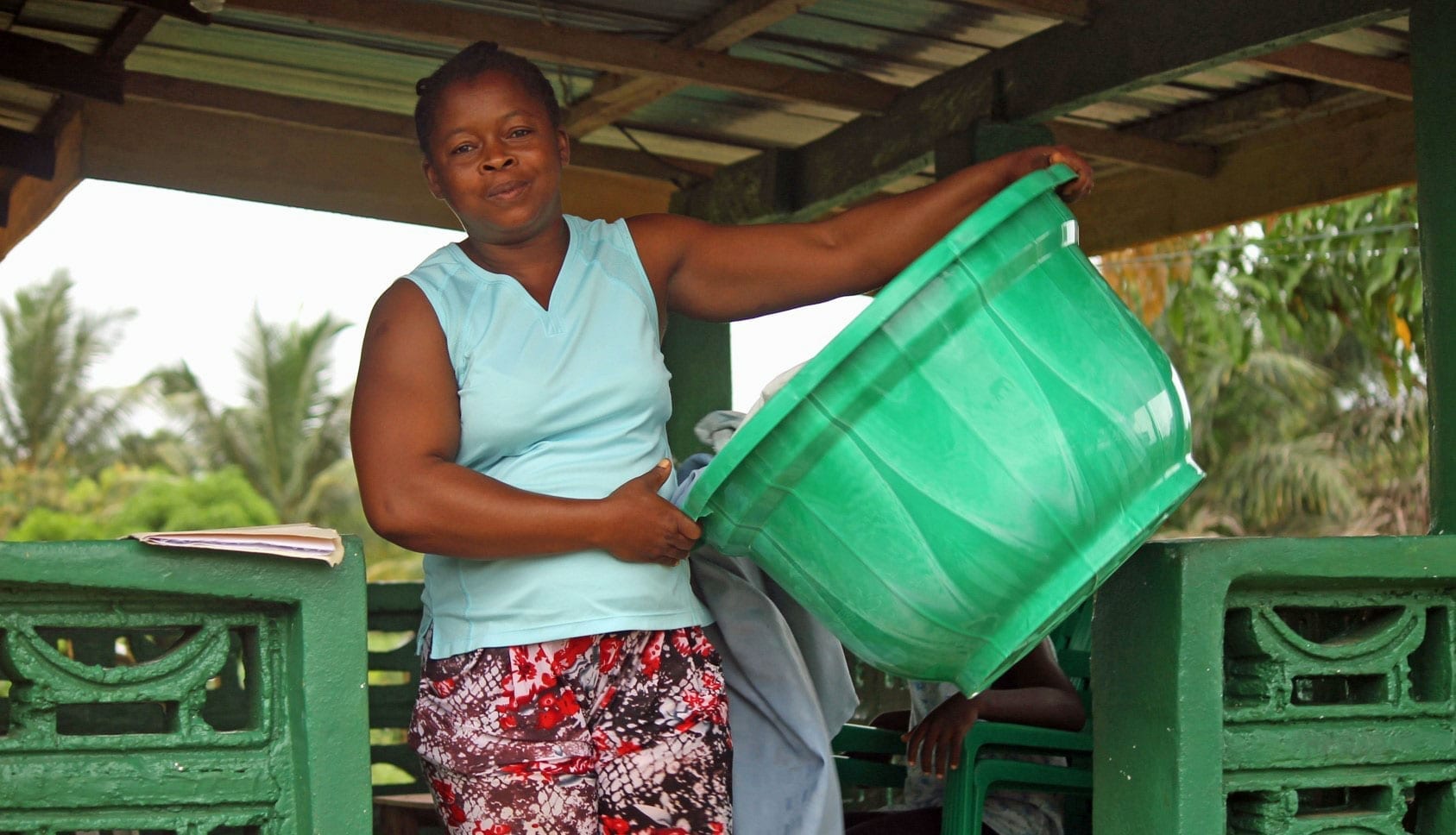
Jun 26, 2015
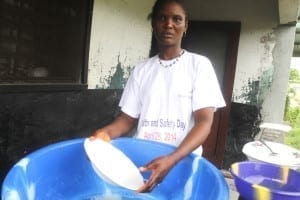
Patricia Miller at the Stephen Tolbert Estate, Monrovia. Credit: Solidarity Center/Bill E. Diggs
Liberian domestic workers and other informal-economy workers in Liberia are set to receive significant wage gains, collective bargaining rights and labor law protection under the Decent Work Bill signed today by President Ellen Johnson Sirleaf. The bill takes effect when printed into handbills for distribution.
Unskilled workers will earn a minimum of $3.50 per day, an amount that is more than five times the $15 per month salary of the lowest-paid domestic workers in Liberia, says Marthaline Cole, coordinator of the Domestic Workers Union of Liberia (DOWUL).
David Sackoh, general secretary of the United Workers’ Union of Liberia (UWUL) and the Liberia Labor Congress, was among those taking part in today’s bill-signing event.
“It’s time for us to join hands together to build and strengthen domestic workers and their union in Liberia,” Sackoh said.
Union leaders waged a years-long campaign for passage of the bill, which was delayed by more than five years over contested wage provisions. The Senate passed a final version last month.
If properly implemented, the new law will help domestic workers recover from the economic impact of the Ebola crisis, including temporary wage loss and permanent job loss.
Many employers laid off domestic workers during the Ebola crisis. Some domestic workers left their jobs to care for sick family members or to recover from illness and were not allowed to return because of social stigma around Ebola.
Until passage of the Decent Work Bill, domestic workers, like other informal-economy workers who were temporarily or permanently laid off during the Ebola crisis, had no legal protections. And only formal-economy workers were covered by the country’s labor law and could form unions and bargain collectively.
Implementation of the minimum wage may be difficult to achieve, says Cole, but the force of law is key.
“Once something is done legally I think people will pay … Definitely you have to abide by it or they can take you to court,” she says.
Inclusion of informal workers under Liberia’s labor law will help workers build collective power, says Cole. DOWUL is trying to rebuild its membership, which was slashed in half by the Ebola crisis, and the new law will enable to union to register with the government for the first time. DOWUL was organized under the leadership of the UWUL, one of Liberia’s two labor federations, and so operated without legal recognition or protection.
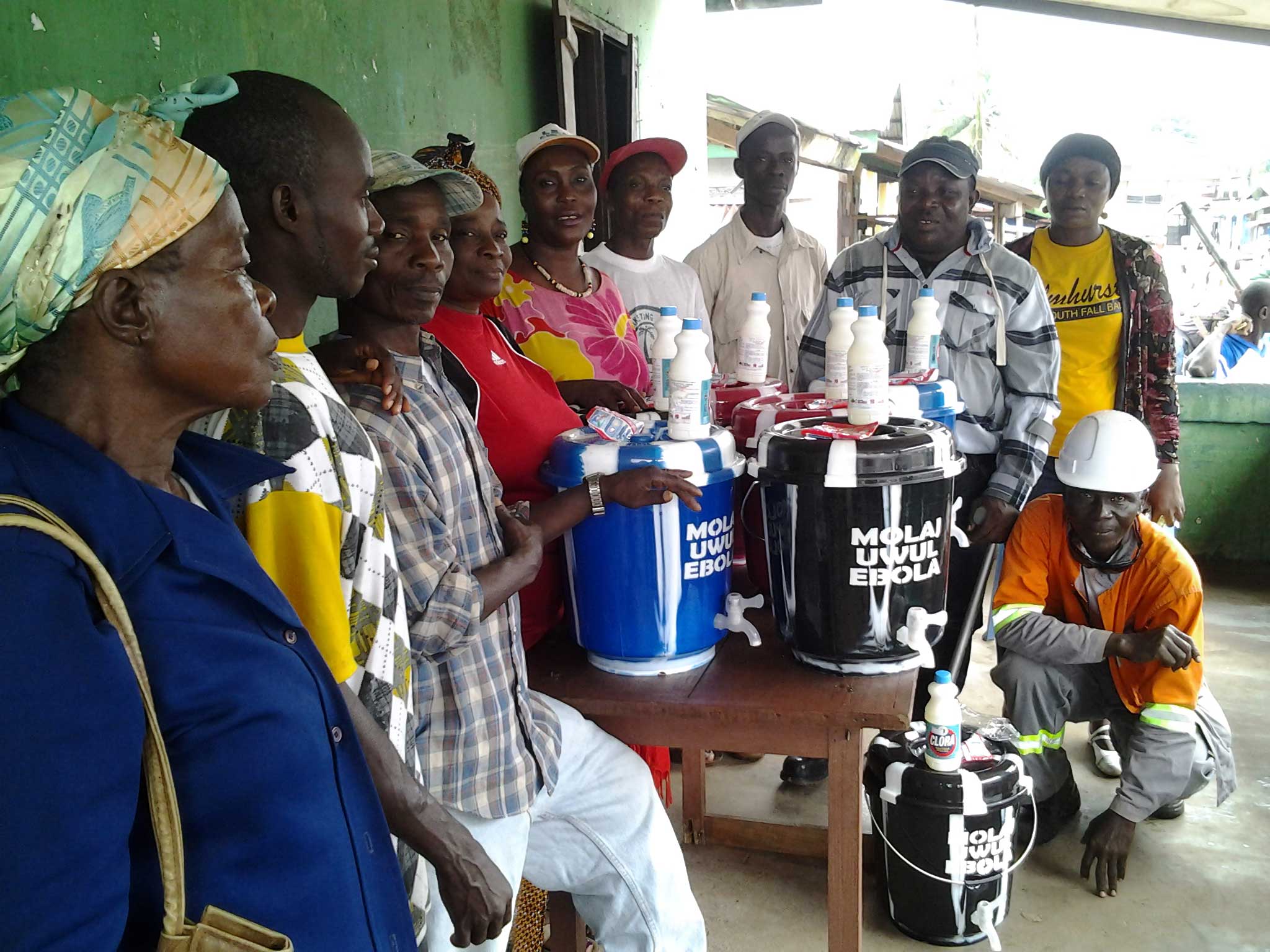
Apr 9, 2015
In Liberia, no new cases of Ebola have been reported in the past week and the overall death toll, while horrific at nearly 4,200, is far less than some health experts predicted last year—a result based in part on the coordinated efforts of the Liberian trade union movement.
Since September, Liberian union volunteers have provided Ebola awareness and preventative education to 75,843 workers and their families. In addition, volunteers have supplied 25,175 hand-washing buckets and soap to 48 workplaces and 63 communities in 13 counties, according to the Liberia Labor Congress.
The Congress also provided food to family members of Ebola victims who were quarantined, and donated 500 gallons of fuel to national and community radio stations, enabling them to step up Ebola education and awareness broadcasts for residents in remote areas inaccessible to volunteers.
“The fight against Ebola by the Liberian labor movement was crucial, as it was the first and only Ebola awareness program that directly reached and impacted on the lives of workers and their families, including community members,” says Liberia Labor Congress Secretary General David Sackoh.
The global labor movement assisted in funding the program, including the United Steelworkers in the United States and Canada and the Solidarity Center, which set up a fund for donations. Solidarity Center allies, the United Workers’ Union of Liberia (UWUL) and the Firestone Agricultural Workers Union of Liberia (FAWUL), took lead roles in the Ebola prevention and education efforts.
Last August, President Ellen Johnson-Sirleaf appointed the Liberia Labor Congress as a member of the National Taskforce on Ebola, and shortly after, the Congress launched the Ebola Awareness Education and Preventive Measures at the Workplace and the Community Campaign.
The Congress, together with the nongovernmental organization, the Movement for Labor Rights and Justice, mapped targeted workplaces and communities where Ebola cases had been registered by the government and international organizations. The Congress and its unions then selected 75 volunteers from among local union leaders, shop stewards and shop-floor members to carry out the project.
The volunteers then took part in a week-long training at UWUL, and each was tasked to reach at least 200 people in eight communities, providing them with Ebola awareness and prevention education and hand-washing supplies.







